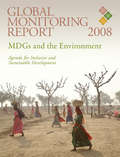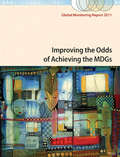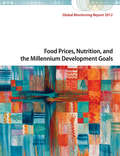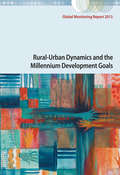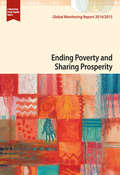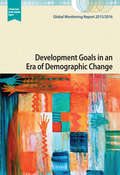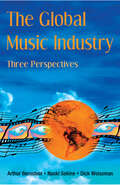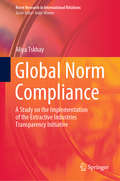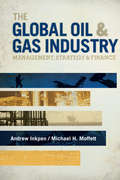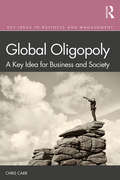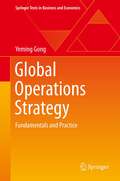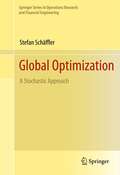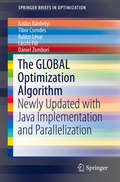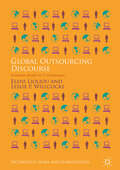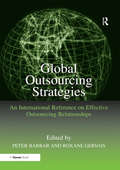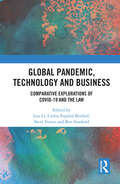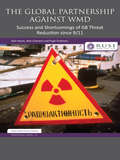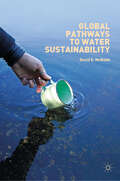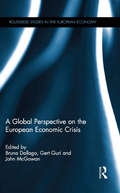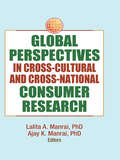- Table View
- List View
Global Monitoring Report 2008
by World Bank'Global Monitoring Report 2008', the fifth in an annual series, is essential reading for those who wish to follow the global development agenda and debate in 2008. The year marks the midpoint toward the 2015 deadline for achieving the Millennium Development Goals (MDGs). It is also an important year to work toward a consensus on how the world is going to respond to the challenge of climate change, building on the foundation laid at the Bali climate change conference in December 2007. The report spans this agenda. It provides a comprehensive assessment of progress toward the MDGs and related policies and actions. It addresses the challenge of climate change and environmental sustainability and assesses its implications for development. The report's assessment of MDGs at midpoint presents a mixed picture, one of both significant progress and formidable challenges. The first MDG, reducing extreme poverty by half, is likely to be met at the global level, thanks to a remarkable surge in global economic growth over the past decade. But, on current trends, the human development MDGs are unlikely to be met. Prospects are gravest for the goals of reducing child and maternal mortality, but shortfalls are also likely in the primary school completion. nutrition, and sanitation MDGs. The potential effects of climate change compound the challenge of achieving the development goals and sustaining progress. The report's messages are clear: urgent action is needed to help the world get back on track to achieve the MDGs; and urgent action is also needed to combat climate change that threatens the well-being of all countries, but particularly of poor countries and poor people. The goals of development and environmental sustainability are closely related, and the paths to those goals have important synergies.
Global Monitoring Report 2011: Improving the Odds of Achieving the MDGs
by International Monetary FundThe report shares what has been done towards meeting the Millenium Development Goals, and how lessons from successes and failures might be applied during the remaining five years of the program to improve chances of accomplishment. The perspectives are the diversity of progress, economic growth in developing countries, linking spending and outcomes in education and health, assisting the indigenous and socially excluded, and progress in the international development and trading framework. There is no index. Annotation ©2011 Book News, Inc. , Portland, OR (booknews. com)
Global Monitoring Report 2011
by The World BankWith less than five years left to achieve the MDGs, this year's report looks at the prospects and challenges for reaching the goals. It also examines the great diversity of performance across indicators, countries, and categories of countries to determine the necessary policies to fill the remaining gaps.
Global Monitoring Report 2012
by International Monetary Fund World BankWhat has been the impact of yet another food price spike on developing countries' ability to make progress toward the Millennium Development Goals (MDGs)? How many poor people have been prevented from lifting themselves out of poverty? How many people, and how many children, have seen their personal growth and development permanently harmed because their families could not afford to buy food? Finally, what can countries do to respond to higher and more volatile food prices? Global Monitoring Report 2012: Food Prices, Nutrition, and the Millennium Development Goals examines these questions. It summarizes the effects of food prices on several MDGs, stressing that recent food price spikes have prevented millions of households from escaping extreme poverty. The report advocates using agricultural policy to orchestrate a supply response; deploying social safety nets to improve resilience; strengthening nutritional policy to manage the implications of early childhood development; and implementing trade policy to improve access to food markets, reduce volatility, and induce productivity gains. The report acknowledges that one size does not fit all and that the sequencing and prioritization of various policy initiatives depend critically on the initial situation a country or region finds itself in. It also discusses support by the international community. The world has met two global MDG targets well before the 2015 deadline. Estimates based on preliminary surveys indicate that the share of people living in extreme poverty in 2010 was half what it was in 1990. The world has also halved the share of people with no safe drinking water. The goal of gender parity in primary and secondary education is on track to be met in 2015, and the goal of ensuring that children everywhere--boys and girls alike--are able to complete primary school is nearly on track. But the MDGs closely linked to food and nutrition, particularly those that aim to reduce child and maternal mortality, are lagging. Global Monitoring Report 2012 was prepared jointly by the World Bank and the International Monetary Fund, with consultations and collaborations with regional development banks and other multilateral partners.
Global Monitoring Report 2013: Rural-Urban Dynamics and the Millennium Development Goals
by the editors at The World BankThe Global Monitoring Report 2013: Rural-Urban Dynamics and the Millennium Development Goals examines rural-urban disparities in the achievement of the Millennium Development Goals (MDGs) and how urbanization, if managed well, can contribute to the attainment of these goals. The report provides information about the differences in progress toward the MDGs across geographical areas and recognizes that urban populations are better off than their rural brethren. However, unfettered urbanization can cause migrants and the urban poor to end up in slums where attainment of the MDGs lags. GMR 2013 calls for an integrated strategy to better manage the planning-connecting-financing formula of urbanization. Notwithstanding the importance of urbanization in poverty reduction and MDG attainment, rural areas remain a huge challenge—one that underscores the importance of policies that can improve rural livelihoods. The rural-urban spectrum ranges from small towns to large cities. The general experience is that poverty is lowest in the largest cities and considerably higher in smaller towns. The MDGs reflect the basic needs of all citizens, and governments should aim to meet them fully in both urban and rural areas. However, resources are scarce, so priorities must be set and trade-offs made. The report argues that the sequencing of actions be tailored to local conditions when it comes to the degree of urbanization and rural-urban differences in MDG outcomes. The world has met four global MDG targets. New estimates confirm the 2012 reports that MDG 1.a—reducing the $1.25-a-day poverty rate (2005 purchasing power parity)—was reached in 2010, falling below half of its 1990 value. The world also met part of MDG 7.c—to halve the proportion of people without safe access to drinking water—in 2010. MDG 7.d—to improve significantly the lives of at least 100 million slum dwellers by 2020—was also achieved. Finally, the first part of MDG 3.a—to eliminate gender disparity in primary education— was accomplished in 2010. Global progress on the full MDG 3.a (to eliminate gender disparity in primary and secondary education) is close to being on track. Global Monitoring Report 2013 was prepared jointly by the World Bank and the International Monetary Fund, with consultations and collaborations with regional development banks and other multilateral partners. Show more
Global Monitoring Report 2014/2015: Ending Poverty and Sharing Prosperity (Global Monitoring Report)
by World Bank International Monetary FundThe Global Monitoring Report 2014/2015 will, for the first time, monitor and report on the World Bank Group's twin goals of ending extreme poverty by 2030 and boosting shared prosperity, while continuing to track progress toward the Millennium Development Goals (MDGs). This Global Monitoring Report examines how a select set of policies in the areas of human capital and the environment can create jobs and make development more inclusive and sustainable, while highlighting how social assistance policies can help end poverty and improve growth prospects. It discusses most of these issues across a full spectrum of countries. This means the Report not only addresses low- and middle-income countries but also, for the first time, includes a discussion of high-income countries as well. The Report will contain quantitative information about the World Bank Group's twin goals: It will provide an assessment on how far the world has to go to end extreme poverty by 2030 and how much of prosperity has been shared with the bottom 40 percent of a country's population. The report is prepared in collaboration with the International Monetary Fund (IMF) and the Organization for Economic Co-operation and Development (OECD).
Global Monitoring Report 2015/2016
by World Bank;International Monetary FundThe Global Monitoring Report 2015/2016, produced by the World Bank Group in partnership with the International Monetary Fund, comes at an inflection point in both the setting of global development goals and the demographic trends affecting those goals. This year marks the end of the Millennium Development Goals (MDGs) and the launching of the Sustainable Development Goals (SDGs), while the World Bank Group has in parallel articulated the twin goals of sustainably ending extreme poverty and sharing prosperity. This report presents the latest global poverty numbers, based on the 2011 purchasing power parity (PPP) data, and examines the pace of development progress through the lens of the evolving global development goals. The special theme of this year's report examines the complex interaction between demographic change and development. With the number of children approaching a global ceiling of two billion, the world's population is growing slower. It is also aging faster, with the share of people of working age starting a decline in 2013. But the direction and pace of these trends vary starkly across countries, with sizeable demographic disparities between centers of global poverty (marked by high fertility) and drivers of global growth (marked by rapid aging). These demographic disparities are expected to deeply affect the pursuit of the post-2015 agenda, accentuating existing challenges and creating new opportunities.
The Global Music Industry: Three Perspectives
by Dick Weissman Arthur Bernstein Naoki SekineFor everyone in the music industry—record labels, managers, music publishers, and the performers themselves—it is important to understand the world music marketplace and how it functions. Yet remarkably little has been written about the music business outside of the U.S. The Global Music Industry: Three Perspectives gives a concise overview of the issues facing everyone in the international music industry. Designed for an introductory course on music business, the book begins with an introduction to the field around the world, then focuses on global issues by region, from bootlegging and copyright to censorship and government support. It will be a standard resource for students, professionals, and musicians.
Global Neoliberal Capitalism and the Alternatives: From Social Democracy to State Capitalisms (Alternatives to Capitalism in the 21st Century)
by David LaneSince the world economic crisis of 2007, commentators have pointed to the dangers of a capitalistic system that seems incapable of delivering sustainable growth and well-being. This bold new book offers an exhaustive diagnosis of global capitalism across the world’s nations. David Lane examines the nature and appeal of neoliberal capitalism according to different schools of thought, and he analyses proposals for its reform and replacement from state socialism and social democratic corporatism to self-sustaining networks. Looking ahead to a novel system of economic and political coordination based on a combination of market socialism and state planning, this book offers crucial insights for scholars thinking about alternatives to capitalism.
Global Norm Compliance: A Study on the Implementation of the Extractive Industries Transparency Initiative (Norm Research in International Relations)
by Aliya TskhayThis book examines the implementation of, the spread of, and compliance with emerging global norms. Based on empirical country studies on the implementation of transparency norms defined by the Extractive Industries Transparency Initiative (EITI) – a multi-stakeholder process seeking to promote global standards for the transparent and accountable management of oil, gas and mineral resources –, it investigates the various factors and motivations affecting actors with regard to norm compliance. The book demonstrates that compliance with global norms depends on a combination of various factors, including motivations and conditions for introducing norms into the domestic political space; local actors’ level of commitment to the norm; and their capacity for norm compliance. Given its scope, the book will appeal to all international relations scholars interested in processes of norm localisation, compliance, and contestation.
The Global Oil & Gas Industry: Management, Strategy and Finance
by Andrew Inkpen Michael H. MoffettDespite its size and importance, a surprising lack of basic knowledge exists about the oil and gas industry.With their timely new book, authors Andrew Inkpen and Michael H. Moffett have written a nontechnical book to help readers with technical backgrounds better understand the business of oil and gas. They describe and analyze the global oil and gas industry, focusing on its strategic, financial, and business aspects and addressing a wide range of topics organized around the oil and gas industry value chain, starting with exploration and ending with products sold to consumers.The Global Oil & Gas Industry is a single source for anyone interested in how the business of the worldís largest industry actually works: business executives, students, government officials and regulators, professionals working in the industry, and the general public.
Global Oligopoly: A Key Idea for Business and Society (Key Ideas in Business and Management)
by Chris CarrThe era of globalisation brought waves of consolidation in business ownership alongside Leviathon-like state actors. Digital disruption too can leave market power in a relatively small number of hands. In organisational and economic terms, global oligopoly is now a fundamental idea for business and society, which this book explores and analyses. This book focuses on global oligopolies, starting with an analysis of global concentration and profits in all sectors, before moving on to illuminate the geographical spread and global strategic orientation choices and performance outcomes of global oligopoly. Contemporary cooperation modes, such as cross-border M&As and strategic alliances, niche and Emerging Market champion strategies are also analysed in detail to move the reader towards understanding likely future directions for the field. Presenting empirical data on strategies and performance outcomes, the book covers a range of industries to provide practical, research-based guidance for more effective global business strategies and policy perspectives.
Global Operations Strategy: Fundamentals and Practice
by Yeming GongWhile many business schools are teaching Global Operations Strategy with self-made teaching materials, there are no such textbooks. Combining practical approaches with detailed theoretical underpinnings, this book provides theories, tools, frameworks, and techniques for global operations strategy, and brings real world perspectives to students and managers. Each chapter includes definition of key terms, introduction of fundamental theories, several short case examples, one long new case to explain the associated theories, and recommended further reading.
Global Optimization
by Stefan SchäfflerThis self-contained monograph presents a new stochastic approach to global optimization problems arising in a variety of disciplines including mathematics, operations research, engineering, and economics. The volume deals with constrained and unconstrained problems and puts a special emphasis on large scale problems. It also introduces a new unified concept for unconstrained, constrained, vector, and stochastic global optimization problems. All methods presented are illustrated by various examples. Practical numerical algorithms are given and analyzed in detail. The topics presented include the randomized curve of steepest descent, the randomized curve of dominated points, the semi-implicit Euler method, the penalty approach, and active set strategies. The optimal decoding of block codes in digital communications is worked out as a case study and shows the potential and high practical relevance of this new approach. Global Optimization: A Stochastic Approach is an elegant account of a refined theory, suitable for researchers and graduate students interested in global optimization and its applications.
The GLOBAL Optimization Algorithm: Newly Updated With Java Implementation And Parallelization (SpringerBriefs in Optimization)
by Balázs Bánhelyi Tibor Csendes Balázs Lévai László Pál Dániel ZomboriThis book explores the updated version of the GLOBAL algorithm which contains improvements for a local search algorithm and new Java implementations. Efficiency comparisons to earlier versions and on the increased speed achieved by the parallelization, are detailed. Examples are provided for students as well as researchers and practitioners in optimization, operations research, and mathematics to compose their own scripts with ease. A GLOBAL manual is presented in the appendix to assist new users with modules and test functions. GLOBAL is a successful stochastic multistart global optimization algorithm that has passed several computational tests, and is efficient and reliable for small to medium dimensional global optimization problems. The algorithm uses clustering to ensure efficiency and is modular in regard to the two local search methods it starts with, but it can also easily apply other local techniques. The strength of this algorithm lies in its reliability and adaptive algorithm parameters. The GLOBAL algorithm is free to download also in the earlier Fortran, C, and MATLAB implementations.
Global Outsourcing and Offshoring: An Integrated Approach to Theory and Corporate Strategy
by Farok J. Contractor Vikas Kumar Sumit K. Kundu Torben PedersenGlobal Outsourcing and Offshoring deals with some of the most fundamental structural and organizational issues facing many companies today. It considers two key strategic decisions, firstly Outsourcing: which activities or functions should be kept in-house versus outsourced; and Offshoring: in which nation is a particular function or operation best performed? These are interrelated and simultaneous decisions that are changing the spatial and organizational configuration of entire industries. The book integrates academic theories from diverse fields, including Economics, Strategy, and Industrial Organization. Contributions are drawn from scholars from 11 nations, who relate theory to practice in the pharmaceutical, automobile, medical records, appliances, human resource management, and telecommunications fields.
Global Outsourcing Discourse: Exploring Modes Of It Governance (Technology, Work And Globalization Ser.)
by Eleni Lioliou Leslie P. WillcocksThe aim of this book is to investigate the discursive power of two original, theoretical lenses when applied to real outsourcing arrangements and phenomena. The Transaction Cost Economics (TCE) and Foucauldian perspectives are brought to bear on five outsourcing relationships in order to test the application of these discourses to rich qualitative data over the outsourcing contractual life-cycle. This will be the first study illustrating the relevance of Foucauldian concepts of governmentality, discourse and power relations to the study of outsourcing arrangements, and will also incorporate the perspectives of both client and supplier organizations. Using discourse analysis, the objective is to critically deconstruct and provide fresh insight into the normative ‘outsourcing’ discourse that has grown up around global sourcing practices over the last 30 years.
Global Outsourcing Strategies: An International Reference on Effective Outsourcing Relationships
by Roxane GervaisOne of the most significant techniques to which companies and organizations have turned to improve service delivery and reduce costs has been outsourcing. Over the last 10 years, almost any process has been successfully outsourced. But during that period there have been failures too; projects that never realised their objectives or that had unforeseen impact on business. Global Outsourcing Strategies is a state-of-the-art guide to the best lessons to be learned for successfully implementing and outsourcing projects, or for revisiting existing operations. The 22 chapters explore some of the new areas for outsourcing, after traditional targets such as IT and finance. Information is provided on the different facets of the outsourcing process, such as contract negotiation, the risks involved in outsourcing, the need for service level agreements, the critical requirements needed to build and sustain outsourcing relationships, and ethical supply chain issues. There are also sections exploring the impact of outsourcing on organizational structures; the long term effects; legal issues; management control and inter-firm relationships; as well as case studies from both the public and private sector on the practical side of outsourcing. The book will appeal to practitioners and researchers alike. This is a must-have guide for any organization approaching outsourcing as a global (or local) strategy and for those organizations now reviewing or developing their outsourcing partnerships.
Global Pandemic, Technology and Business: Comparative Explorations of COVID-19 and the Law
by Luo Li Carlos Espaliú Berdud Steve Foster Ben StanfordThis book presents an exploration of a wide range of issues in law, regulation and legal rights in the sectors of information protection, the creative economy and business activities following COVID-19. The debilitative effect of the global pandemic on information protection and creative and business activities is powerful, widespread and deeply influential, bringing a range of uncertainties to these sectors. The effects of the crisis challenge the fundamentals of the legal systems of most countries in their attempt to govern them. Written by international academics from a diversified background of law disciplines and legal systems, this book offers a global vision in exploring the wide range of legal issues caused by the COVID-19 crisis in these fields. The book is organised into three clear thematic parts: Part I looks at information protection and intellectual property rights and strategies; Part II examines contracts, cooperation and mediation in the post-COVID-19 market arena; and Part III discusses issues pertaining to corporate governance and employment rights. The book explores the unprecedented challenges posed by the pandemic crisis from a global perspective. It will provide invaluable information and guidance in this area to those in the fields of law, politics, and economics whose interests are related to information, business and the creative industry, as well as providing indispensable reading to business practitioners and public servants.
The Global Partnership Against WMD: Success and Shortcomings of G8 Threat Reduction since 9/11 (Whitehall Papers)
by Alan Heyes Wyn Q. Bowen Hugh ChalmersThe 9/11 terrorist attacks prompted a new urgency in efforts to deal with chemical, biological, radiological and nuclear proliferati on. The potential acquisition and use by terrorist groups of such weaponry was suddenly a much increased threat. The G8 Global Partnership against the Spread of Weapons and Materials of Mass Destruction subsequently encouraged some twenty-two countries and the European Union to pledge up to $20 billion to address this challenge. The creation of the Global Partnership was the first time so many countries agreed to collaborate on a range of non-proliferation, security and nuclear safety programmes, as well as commit such an amount of resources to them. Based on extensive primary research, this Whitehall Paper assesses the success and shortcomings to date of the Global Partnership, and suggests how the mechanism can be bolstered and taken forward.
Global Pathways to Water Sustainability
by David E. McNabbThis book investigates the current and future state of freshwater and the global drive to achieve the UN sustainability goal. It first explores the major barriers to achieving the goal and then examines some of the programs water managers are adopting to overcome those barriers. These programs include finding new ways to supplement existing water supplies, and greater acceptance of alternative supplies, such as recycled waste water and desalination; green infrastructures, and rain and storm water harvesting. It concludes with two chapters on water management tools, including asset management and strategic planning, which are of particular interest to small water and wastewater utilities.
Global Pension Challenges: Pensions, Saving and Retirement in the Twenty-First Century (Contemporary Issues in Finance)
by Patrick J. Ring Jonquil Lowe Lien LuuNational pension systems face a range of tough social and economic demands and pressures. These are complex to navigate, especially in a twenty-first century world that has ushered in global uncertainty and pressing challenges - even threatening the planet’s very sustainability – with implications for pensions that policymakers, financial services providers and individuals themselves must address.This book probes, and unpacks, what pension systems aim to achieve, the uncertainties they face and how they are attempting to resolve them. Analysing pension provision from the systemic, political-economy and individual perspectives, it sets out and contextualises commonalities and differences in pension systems across the globe, looking at current developments in both public and private pension provision, structures and regulation. Moreover, the reader is encouraged to question how national pension systems can best serve their populations and ensure the ‘sustainability’ of later-life incomes in the light of today’s global pension challenges.Global Pension Challenges: Pensions, Saving and Retirement in the Twenty‑First Century is an essential read for business, finance and social-policy academics and students, those working in the pensions industry and in the areas of welfare reform and advocacy, as well as the general public wishing to know more about the retirement issues we will all face in the coming years.
Global Pension Crisis
by Robert H. Frank Richard A. MarinA comprehensive look at the crisis of unfunded pension liabilities and what must be done to avoid the same problem in the futureAs the generational bubble of the Baby Boomers begins to retire, it is increasingly evident that governments, corporations, and individuals have failed to adequately prepare for the obligations and needs of this giant cohort. Retirees are outliving actuarial life expectancies, pension liabilities are skyrocketing, pension plans are underfunded, and medical costs rise, the United States alone can expect unfunded liabilities to exceed $4 trillion.Even while the American economy shows signs of sustained recovery, states and local governments will still experience sharp increases in pension fund payments through the next year or longer. Global Pension Crisis looks at this situation and offers practical advice for retirement plan managers and financial advisors, while also explaining how to strengthen pensions and prevent similar crises in the future.Offers a clear and comprehensive explanation of the current pension crisis for retirement fund managers, financial advisors, and economistsIncludes prescriptive guidance on how to strengthen the pension fund system and prevent another similar crisisWritten by venture capitalist, entrepreneur, and former senior Wall Street executive Rich Marin
A Global Perspective on the European Economic Crisis (Routledge Studies in the European Economy)
by Bruno Dallago, Gert Guri and John McGowanThe financial and economic crisis in Europe is not over, and the radically opposing strategies on how to proceed has only increased the complexity of problems in the region, revealing the shortcomings of the EU’s architecture. The European Union, perhaps for the first time in its history of more than seventy years, is being perceived as a threat to the financial and monetary stability of the world. A Global Perspective on the European Economic Crisis explores the connection between internal EU actions and institutions and the external factors that influence the ongoing response to the European crisis. With a unique collection of international and interdisciplinary essays, this book considers the complex macroeconomic and challenging political landscape of Europe, looking at how and why the European Union is untenable in its current state. The chapters outline what should be done to make the common currency area more resilient, and explain why external events are particularly problematic for the EU, ultimately offering suggestions for what Europeans should do in order to avoid harmful internal consequences. This volume confronts the causes of the crisis’ persistence, its economic and political consequences, and the impact of more recent events and policy decisions. It will be of interest to researchers and policy-makers keen to understand the EU relations and the influence of international organizations in the European economic crisis.
Global Perspectives in Cross-Cultural and Cross-National Consumer Research
by Erdener Kaynak Lalita ManraiGlobal Perspectives in Cross-Cultural and Cross-National Consumer Research deals with several important issues crucial for greater understanding of international and cross-cultural consumer behavior. This understanding in turn can provide international marketers with valuable insights, such as conditions under which globalization may or may not work. The coverage in this book is interdisciplinary in nature, and the chapters discuss several constructs (intermediary variables, processes, and also other environmental influences) related to social, personal, and psychological components or consequences of culture.The book begins with a conceptual model of the effect of culture on consumer behavior, with the components and consequences of the cultural influences clearly identified in terms of social, personal, and psychological factors. The following chapters discuss general issues related to globalization and standardization, present conceptual approaches to propositions relating to multicultural contexts, and address consumer complaining behavior and responses to advertising. There are five chapters on empirical and methodological studies conducted in specific pairs of countries, with data obtained from Canada, Denmark, Japan, Germany, Poland, Romania, and the United States. In presenting readers with new information, Global Perspectives in Cross-Cultural and Cross-National Consumer Research spans these specific topics: the nature of cultural influence on consumer behavior globalization versus customization of international marketing strategy individualism versus collectivism right versus left symbolism product involvement consumer response to information technology interdependent versus independent culturesThe contributors are well-known scholars in the international/cross-cultural marketing field; their chapters present state-of-the-art developments in this area. The coverage of the material is interdisciplinary in nature and is likely to benefit a broad audience, especially academic researchers in international or cross-cultural consumer research and librarians of research-oriented schools, universities, or organizations.
